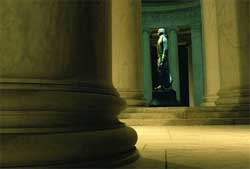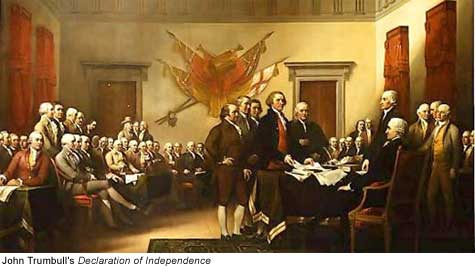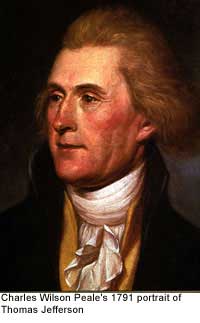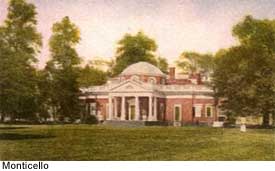|  Thomas Jefferson was the third President of the United States. He was the first President to be inaugurated in Washington DC, a city that he helped plan. The foremost spokesperson for Democracy of his time, he was the author of the Declaration of Independence. Thomas Jefferson was the third President of the United States. He was the first President to be inaugurated in Washington DC, a city that he helped plan. The foremost spokesperson for Democracy of his time, he was the author of the Declaration of Independence.
Although he kept slaves, Jefferson is famed as a champion of political and religious freedom. Jefferson loved liberty in every form and he worked for freedom of speech, press, religion, and civil liberties. Jefferson swore "eternal hostility against every form of tyranny over the mind's of man." "Jeffersonian Democracy" refers to the ideal that the majority of people must govern themselves. He wanted to keep the government simple and free of waste.

Jefferson was born in Virginia in 1743. His family was wealthy and gave him a classical education. He graduated from William and Mary College. He was a philosopher, educator, naturalist, politician, scientist, architect, inventor, musician, farmer, and writer. He had a wide variety of interests, and he accomplished a great deal. As an architect, he was known for designing Washington DC, the Virginia Capitol, his Monticello estate, and the University of Virginia, which he founded. As a writer, he was the principal author of the Declaration of Independence, as well as of Virginia's Statute of Religious Freedom, the Manual of Parliamentary Practice and much more.
On New Year's Day in 1772, Jefferson had married Martha Wayles Skelton, a 24-year-old widow. In 1782 she died giving birth to his sixth child. He did not allow his children educated in Europe because he did not believe in their views toward man. They grew up studying in America, but were socially raised in the European style as their father.

Jefferson was first elected to the Virginia House of Burgesses in 1769. There, along with its other outspoken leader, Patrick Henry, he was a leader of the patriot faction. He was a legislator for Virginia from 1776 to 1779. In 1779, he was elected as Governor of Virginia. He failed keep the British from invading, but successfully guided the state through the troubled last years of the American Revolution.

From 1784 to 1789, Jefferson replaced Benjamin Franklin as minister to France. He supported the French in their Revolution. He also served as Secretary of State under George Washington, a position from which Jefferson retired at the end of Washington's first term. He kept active and continued to promote the Democratic-Republican views versus the Hamilton Federalist position. Both Jefferson and Hamilton went on to head their individual parties.
The two men had fundamental differences between them. Jefferson believed in an agrarian economy and a government that rested firmly in the hands of the people. Hamilton was more interested in commerce, was not so trusting of the people, and believed in a strong central government. These differences were the frameworks that created two distinct political parties.

 Jefferson served as Vice President under John Adams. Jefferson took a strong stand against the Alien and Sedition Acts, which prevented criticism of the government, as well as curtailed the privileges of non-citizens. The Acts had the effect of stifling criticism against President John Adams and his Federalist Congress, and Jefferson was outraged, believing them to be unconstitutional, according to the First Amendment. The Kentucky and Virginia Resolutions, written by Jefferson and James Madison, gave states the right to nullify any federal law they felt the government didn't have the right to make. Jefferson served as Vice President under John Adams. Jefferson took a strong stand against the Alien and Sedition Acts, which prevented criticism of the government, as well as curtailed the privileges of non-citizens. The Acts had the effect of stifling criticism against President John Adams and his Federalist Congress, and Jefferson was outraged, believing them to be unconstitutional, according to the First Amendment. The Kentucky and Virginia Resolutions, written by Jefferson and James Madison, gave states the right to nullify any federal law they felt the government didn't have the right to make.
Jefferson tied with Aaron Burr during the presidential election in 1800, so the House of Representatives had to break the tie. Jefferson was declared President after thirty-six ballots. This led to the change in the voting system that required a separate vote be taken for President and Vice President.
Thomas Jefferson's major presidential achievement was the Louisiana Purchase, through which the United States acquired all the lands owned by the French in North America. It doubled the size of the country. The Tripolitan War with the North African Barbary States also took place during Jefferson's tenure. This war was started because the Pasha of Tripoli demanded a tribute from American ships going through Tripoli's waters. The war ended in 1805 when the Pasha agreed to peace.
The Embargo Act of 1807 was passed during his second administration. The prohibited exports from the United States. Unfortunately, it injured the United States more than it did Britain or France. The law had been passed in retaliation for attacks on US shipping. The law was finally repealed in 1809.

 Jefferson retired from the presidency in 1809 to his estate in Monticello. There he pursued his numerous interests in science, music, and agriculture, to name a few. Jefferson was one of the most skilled and educated men that ever held office as President of the United States. The Jefferson Memorial and his Monticello mansion reflect the man and his class. Jefferson retired from the presidency in 1809 to his estate in Monticello. There he pursued his numerous interests in science, music, and agriculture, to name a few. Jefferson was one of the most skilled and educated men that ever held office as President of the United States. The Jefferson Memorial and his Monticello mansion reflect the man and his class.
It was Jefferson who developed the decimal system, upon which our currency is based. His picture can be found on the American nickel and on the two-dollar bill. His garden was said to be one of the finest in the America's, and, as if that wasn't enough, he wrote a vocabulary of Indian languages. In keeping with his many and varied interests, Jefferson collected books, and his personal library of more than 6,400 volumes, provided a major beginning of the Library of Congress. |

